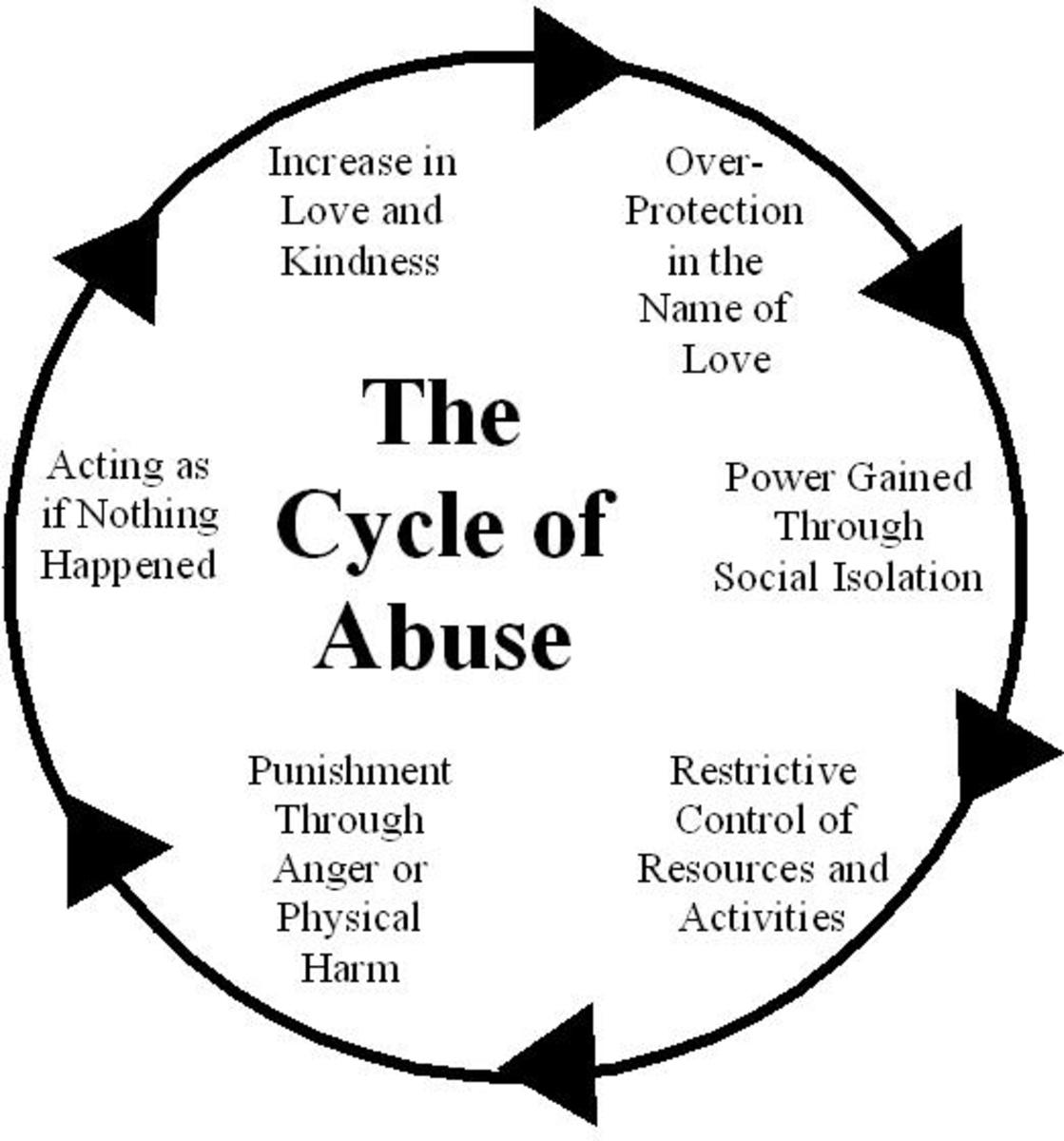Signs of a Psychologically Abusive Relationship

I’m writing this article to hopefully save other people from dealing with the kind of abuse I dealt with for several years in the past. This article will discus the many types of psychological abuse that everybody should watch out for. Not all abuse is physical and just because your partner isn’t hitting you doesn’t mean they aren’t abusive. All cases, and people are different to so not all of these sections below will describe every incident the exact same way as it might be happening. One important thing to note is that this kind of abuse can happen to anybody, any gender, straight, gay, or otherwise. These kinds of situations aren’t specific to just romantic relationships either, you can be abused by your friends and other family members to, even managers or boss’s. This kind of abuse is subtle and will happen gradually over time. They act normal for the first few months or even years, changing your mental views ever so slightly. This article will talk about the extremes and the subtle signs to look out for.
What is Psychological Abuse?
The term psychological abuse is a sort of umbrella term for all forms that aren’t physical. It covers emotional, mental, and manipulative abuse. The main objective is usually to influence a person through mental distortion and emotional extortion with the intent to gain control over the other person. There is a wide range of ways a person can do this such as verbal abuse, intellectual bullying, name calling, and humiliation. Though the laws may vary in your state or country, this kind of behavior is only labeled as abuse if it shows up as a pattern or continuously. Once instance of these kinds of behaviors does not qualify as psychological abuse.
Verbal Abuse
Verbal abuse is more common then you might think as it can be many things. If someone constantly calls you names such as stupid, fat, ugly, useless, worthless, lazy and other degrading terms on a regular basis this is verbal abuse.
Mocking someone or imitating them in a harsh and degrading way with the purpose of causing them distress can also be a humiliation tactic.
Talking down to someone constantly can also be a form of abuse if the purpose of talking to them like a child is to make the abuser feel smarter and in charge. Some examples of this are someone telling you you aren’t smart/good/pretty/brave enough to do things on your own. They also may tell you that you can’t make good decisions on your own and will always make choices for you and tell you that you’d only mess things up. They might constantly need to look over any work or decisions you make to ensure it’s up to their standards.
Another very common form of verbal abuse is raising ones voice, yelling and screaming profanity at someone to insult them or threaten them. This is to intimidate and cause fear in the other person and force them to back down and surrender to the one yelling. It makes the abuser feel dominant over the victim.
Humiliation
This can be someone embarrassing you on purpose in social situations or in public but it can also happen behind closed doors. Someone might talk loudly about your insecurities around friends, family or strangers in a blatantly hurtful manor. This can also be when someone continuously interrupts you to “correct” your story or simply talks over you on purpose They may talk down to you in front of others to make you look and feel stupid or like a helpless child.
They may also humiliate you by taking over when you order at a restaurant or choose items for you in a store or at a family gathering. They might also bring up painful memories of times when you made a mistake or had an accident even if you've asked them not to.
Humiliation in the home can be a bit different, but just as bad. Your partner might force you to ask permission to do simple basic tasks such as use the restroom, eat or sleep even. You might be told you need to ask before doing these things because it could interfere with your partners activities. They will make you feel like they are more valuable then you. They may demand that you must bow to their every need even if you don’t consent to everything.
Punishment and Accusations
Your abuser might punish you if you step out of line or don’t agree to everything they say or ask of you. One method of punishment could be to refuse communication. They might lock themselves in a spare room or just the bedroom and refuse to acknowledge your existence. Some might even lock you in a room until they let you out. This can also be seen as the silent treatment and they won’t talk with you unless you admit you were at fault.
Another method is to become emotionally withdrawn, so not exactly being silent but not showing emotion to you. They can also amp up their emotions to make you feel guilty and that you hurt them. They will begin to cry fake tears and bombard you with questions such as “Don’t you love me anymore?” or “Are you leaving me? You can’t leave me!” and “I’m the only one who will ever love you! Nobody else will accept you because you’re crazy/broken!”
Another method of punishment is just to accuse you of things they might be doing themselves. They might interrogate you and ask if you are cheating on them. They may say they have proof but refuse to show you or just repeat that they know until you break and admit to it even if you aren’t doing anything.
Threatening to take away something important to you is a common punishment by abusers. When they get angry they might threaten to take away a phone, computer, car keys, or even sometimes privileges like showering or eating unless you promise to obey them and not upset them again.
Manipulation of Facts and Events
This is something they do in order to brainwash you and it’s a section I’m very familiar with. My ex-husband used these methods a lot with me and others. They will tell little lies at first and as time goes on will get bigger and more complex. They will make excuses more often for reasons why things that happen aren’t their fault. They will explain to you why things are your fault, how you are guilty of causing your own pain and problems. They will often exaggerate situations to make them seem worse then it is. They will also withhold information from you to make you believe situations are not as bad as they really are.
After some time, they will have you lie to your friends and family to keep up their own lies and illusions. If you slip up, it will be because you are the one lying, not the abuser. To them, nothing is their fault because they can do no wrong. If they do admit to being in the wrong it’s quickly deflected and made to sound as though it’s still your fault for making them do or say things. This insures that you will need to rely on them to tell you what is and isn’t ok to say and who you can and can’t speak to. It will give them a sort of valid reason for interrupting you in conversation or just talking for you when you are with other people.
If your abuser has strong views and opinions on things, you have to have the same. If your abuser is against something such as gay marriage then you have to be as well or you are wrong. They will tell you anything they need to, throw any kind of ‘facts’ at you until you believe exactly the same things that they do.
Isolation and Lack of Privacy
Some abusers will make you believe that your family and friends are against you and them. They will tell you things such as “They don’t want to see you happy.” or “Your friend is just jealous of us, and they are trying to break us up.” They will tell you not to discus your personal relationship with anybody because others just won’t understand. Some abusers will even convince you to move states away from your family and friends so you will only have them.
Sometimes they will start to accuse you of trying to leave or cheat on them because you want to go spend time with other people besides them. If you go to a friends house for dinner, or to your parent’s for a visit without them, they might get angry and accuse or threaten you. This can lead to you never being allowed to leave the home without your partner as an escort.
Sometimes this can lead to a lack of privacy, however they don’t always use both tactics. Lack of privacy is when your abuser needs to know your passwords to everything from your phone to your work log in. They will need to monitor your conversations and online activity to insure you are “safe”. They might refuse to let you have their passwords or to see their phone because they have important or personal things on them. They will want to know every single person you are talking to and read every message you send. If someone calls you they will want to listen in and might even direct you on what you will say to the other person.

Mental Breakdown and Control
The goal for abusers is almost always the same, it’s to have complete power and control over their victim. They will use many tactics to do this, including breaking you down mentally. They might point out your flaws and insecurities constantly and remind you of them. They may also verbally compare you to others and point out how much stronger/prettier/smarter they are then you. “Hey, that person is sort of like you, just smarter/prettier/stronger.” These kinds of comments are supposed to make you feel inferior and insure self doubt. The abuser will convince you that they are doing you a favor by being with you and that they are the only person who can and will love you. In an attempt to break you down, they might also exclude you from important or special activities or events. The reason might be that you would have been embarrassing, or that you wouldn’t understand what was going on.
They can also break you down and over power you mentally by convincing you that you can’t make good choices. That you are always wrong in some way, and so you need the abuser to make choices for you or to always help you in making decisions. Once they have enough power over you, you become their property. You essentially belong to them in their mind. They will be the one in charge of your life and your life choices, what food you are allowed to pick from the store or restaurant, how often and how long you shower or bath. They will even control when you are intimate with them and tell you it’s your job to make them happy. Once they have that control over your mind, you will become like a slave to them and they will have you feeling that this is simply your job as their partner.
Some abusers may even go as far as to refuse to allow you to get a job if theirs is good enough to provide for you both. They might even not allow you to drive anywhere on your own or go for walks around the block. Some of them won’t allow you to have your own phone, or a personal social media page.
How Do You Feel?
We've discussed the actions of the abusers, but how do you feel in your relationship? Do you feel valued? Safe? Respected? Do you truly feel loved? Abusive partners will make you feel as though you are never good enough, that you are dumb and incompetent. They will make you feel like you can't survive without them around and that you need them. They will make you feel insecure about your mind and body, about the people you used to be friends with and about how your family feels about you. They make you feel like you can only trust them, and that you can't even trust yourself. If your partner makes you feel any of this, then chances are they are abusing you.
A healthy relationship is about making your partner feel really loved, valued, needed and safe. They should lift you up when you feel down, make you feel beautiful and handsome. They should comfort you when you feel upset, not make you feel worse. They should be your support and you should be theirs. Relationships are a two-way street that are supposed to be 50-50. Yes, sometimes couples will fight but it should never be a daily or regular occurrence.
If you feel like you are being abused, please reach out and talk to someone.
How to Get Help
If you or someone you know is dealing with psychological abuse, please tell someone or reach out for help. It can be extremely hard to get out of these kinds of situations, and even harder to see the signs if you are the one being abused.
I didn’t see anything wrong with my past relationship until I finally got out. It is a very traumatic experience and takes time to escape and recover. I still have moments when I'm with my current partner and I'll ask permission to do simple tasks when I don't need to. I was with my abusive partner for almost 10 years, so certain things he trained me to do are still embedded in my mind and daily routines. I've been away from my abuser for almost 6 years now and I'm still recovering.
There is help out there for people who deal with this, there are numbers to call, locations to go to for shelter. You are not alone, you are strong and you do have support! If you would like more online help and resources, click here.
National Domestic Violence Hotline- 800-799-7233
Suicide Prevention Hotline- 1-80-273-8255
This content is accurate and true to the best of the author’s knowledge and is not meant to substitute for formal and individualized advice from a qualified professional.








